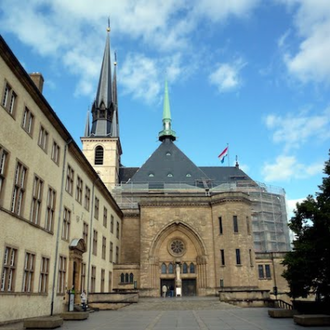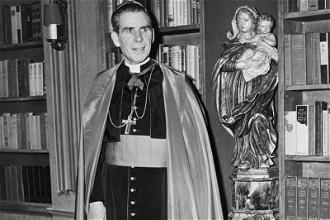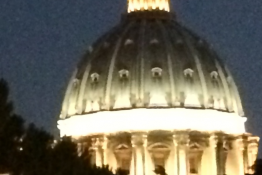Pope begins visit to Luxembourg and Belgium

Notre Dame Cathedral Luxembourg - Wiki Image
Source: Vatican Media
Pope Francis has begun his 46th Apostolic Journey abroad to Luxembourg and Belgium.
Before leaving Rome this morning the Holy Father met several homeless people, accompanied by the Papal Almoner Cardinal Konrad Krajewski.
Continuing a tradition that dates back to the beginning of his pontificate, Pope Francis always seeks to greet the poor as he leaves the Vatican for his Apostolic Journeys "because they represent Christ," Cardinal Krajewski told Vatican News.
The papal plane left Fiumicino Airport at 8.29am.
The Pope's first events after the 90 minute flight were private meetings with Grand Duke Henri of Luxembourg, the European country's Head of State, and Luc Frieden, the Prime Minister.
He then gave a speech to the country's civil authorities and diplomatic corps in the Grand Duchy at the Cercle Cité palace. The Pope said Luxembourg has frequently found itself at the crossroads of Europe's most significant historical events and acknowledged its crucial role in promoting peace and unity in Europe after the ravages of World War II, as a founding member of the European Union .
He praised its "solid democratic structure," which promotes human dignity and the common good, allowing this small nation at the heart of Europe to thrive and to play a major role on the international stage.
"Indeed, it is not the size of the territory nor the number of inhabitants that serve as indispensable conditions for a State to play an important part on the international stage, or for it to become an economic and financial nerve centre."
Drawing on the words of Saint John Paul II during his Apostolic Journey to Luxembourg in 1985, Pope Francis reiterated the need for solidarity among nations, especially in supporting poorer countries.
He encouraged Luxembourg in its role as an "important crossroads of cultures" to continue its mission of promoting cooperation globally, so that "all may become protagonists in an organized process of integral development," in line with the Church's social doctrine.
The Pope called in particular for a model of development that respects the environment and opposes social exclusion, reminding the audience "that having wealth includes responsibility... For development to be authentic and integral, we must not plunder or degrade our common home. Likewise, we must not abandon peoples or social groups on the margins."
He insisted on the duty of rich nations like Luxembourg to help disadvantaged countries to rise from poverty, also to "to ensure a decrease in the number of those forced to emigrate."
In this regard, he noted, the Grand Duchy, with its history and multicultural population, can serve as a model for welcoming and integrating migrants and refugees.
Turning to the present world situation, Pope Francis decried the resurgence of deadly conflicts even in Europe, which tell us that humanity tends to "forget" the past , periodically returning "to the tragic path of war."
"Let's not forget that war is always a defeat. It is very sad to see that in a European country the investments that generate the most income are the manufacture of weapons," he pointed out.
Pope Francis stressed the need for peoples and their leaders to be "motivated by noble and profound spiritual values." It is these values, he said, that allow us not to fall into the same mistakes of the past, made even worse today "by the greater technological power that human beings now possess."
Reaffirming the Church's commitment to promoting peace and fraternity inspired by the Gospel, Pope Francis highlighted that Luxembourg can show everyone the advantages of peace as opposed to the horrors of war, and the benefits of cooperation between nations.
He again urged world leaders to engage "resolutely" in honest negotiations to resolve differences, together with a "willingness to find honourable compromises, which undermine nothing and can instead build security and peace for all."
"As the Successor of the Apostle Peter, and on behalf of the Church, which is an expert in humanity, I am here to testify that the Gospel is the life source and the ever fresh force of personal and social renewal."
Bringing his speech to a close, Pope Francis explained that the motto of his visit "Pour servir" - "To serve" - refers to the Church's mission, but applies to everyone as a noble task and way of life to be followed each day. Even those who have no faith, he added, "should work for their brothers, work for their country, work for society. This is a path for everyone, always for the common good!"
"May God enable you always to serve with a joyful and generous heart," he concluded.
For the final event of the day, Pope Francis addressed a gathering of Luxembourg's Catholic community gathered in Notre-Dame Cathedral. The event coincided with a Marian Jubilee, marking four centuries of devotion to Mary, Consoler of the Afflicted.
In his reflection Pope Francis focused on three key themes: service, mission, and joy.
Pope Francis noted that serving is an action which "is at the very heart of the Gospel". Pope Francis highlighted that in a nation with a long tradition of welcoming those in need, there is a huge urgency of hospitality, it is not only a matter of charity, he said, "but also justice". He praised Luxembourg's openness, urging the faithful to remain steadfast in this practice. "The spirit of the Gospel is a spirit of welcoming, of openness to everyone; it does not admit any kind of exclusion", said the Pope.
Pope Francis' second point of his address highlighted the Church's mission in an increasingly secular society, stressing the need for the Church to embrace this evolution without losing sight of its core values. "We cannot close ourselves off in sadness, resignation, or resentment," said the Pope, inviting the Catholic of Luxembourg, to instead be "dynamic", always responding to the challenges of the times. This, he said, is done by being a "missionary Church."
With this in mind, Pope Francis encouraged a spirit of synodality as a means of strengthening community life and spreading the Gospel message.
The third theme Pope Francis explored was joy, which he described as "an integral part of Christian faith." He reflected on the testimony of Diogo, a young man who shared his joyful experience at World Youth Day. Pope Francis said that Diogo's joy is emblematic of the Gospel message. "Our faith is full of joy, it is a 'dance', because we know that we are children of a God who is our friend," he said.
The Pope also spoke of the unique Spring Procession in Luxembourg. This procession, where the faithful, accompanied by pilgrims, dance through the streets as they commemorate Saint Willibrord's missionary efforts "becomes a great unified dance," he said.
Pope Francis concluded by reminding people that the mission entrusted to them is "beautiful... Let us console and serve, following Mary's example and with her help," he said.


















